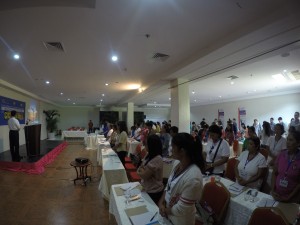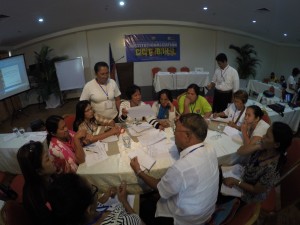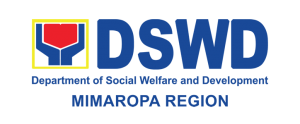
PUERTO PRINCESA CITY – More than 50 Pantawid Pamilya parent leaders from the different barangays of the city attended the Consultation Conference on the Institutionalization of Conditional Cash Transfer (CCT) bill led by Chaplain Isaias Cabral of National Auxiliary Chaplaincy Philippines (NACPHIL) at Palawan Uno Hotel.
The CSO-led activity aims to provide updates on the CCT bill, share significant information and get recommendations through active discussions with the partner-beneficiaries themselves.
Regional Program Coordinator Vincent Dominic Obcena presented the status of the bill and showed the differing contents in the components of the bills in the House of the Representatives and Senate, and how it is in line with the DSWD’s current implementation of the program.
The parent leaders raised and expressed their concerns on every component presented and provided inputs and suggestions that will be essential in the upcoming joint-session of the House and Senate this coming May.
The main concerns were in the components of program conditionalities and grant rates. In program conditionalities, the House proposes four additions: livelihood, cleanliness, tree planting and Bayanihan aside from the current conditions of ensuring 85% attendance in school of every child; consultation/birthing of pregnant women on health centers; vaccine and regular check-up for children -0-5; deworming of children 0-14; and attending Family Development Session once a month.

In grant rates, an additional Php700/child in senior high and Php300 as a supplementary education grant for a child who has maintained passing grades in all subjects are proposed while the existing design allows a maximum of three children per household with Php300/child in elementary, Php500/child in junior high, and Php500 for health and nutrition.
In addition, the maximum program limit or the duration of being beneficiaries is also a concern for the participants. The House bill only limits the household to five years while the Department insists that until there is a qualified 0-18 years old and classified as poor by the Listahanan, they must be covered by the program.
All of the discussed points, suggestions and recommendations were documented and will be included in the bicameral session. In her remarks, DSWD MiMaRoPa Regional Director reminded the partner-beneficiaries of their roles and responsibilities. She reiterated, “Nasa kamay ninyo ang pagpapatuloy ng pagbabago sa inyong buhay,” reminding them that change is within their reach as long as they work hard on it.
At the end, the parent leaders made an action plan to push for the institutionalization of the bill listing signature campaign, talks with the barangay council, face-to-face discussion with the officials, among others as their move to let their voices be heard. ##
![]()


